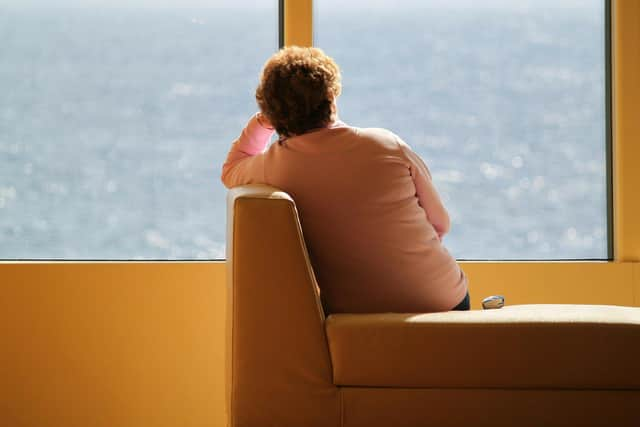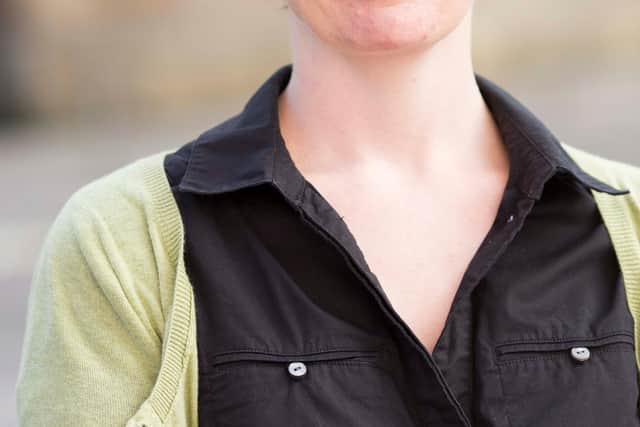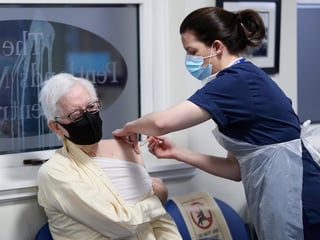Insight: What does a winter lockdown mean for Scots' mental health?
She met friends to go out for the day from her Fife home to Dunfermline, Dundee or Edinburgh.
“Life was great,” she says.
But a year on, Ms Robertson’s life has changed hugely.


“I cannot go anywhere, even out for coffee or lunch,” she says.
Advertisement
Hide AdAdvertisement
Hide Ad“I cannot see friends and family. All we hear is depressing news. I have done everything that has been asked of me… I thought now we have a vaccine things would improve but no, things have got worse.”
Ms Robertson is one of many Scots finding that nine months of the Covid-19 pandemic, coupled with a dark, cold January and a new lockdown, is taking its toll.
Campaigners have long been warning of a mental health “crisis”, and research from Glasgow University and the Scottish Association for Mental Health (SAMH) showed the first six weeks of Covid-19 lockdown, from the end of March 2020 to the first week in May, had a major impact on people’s mental health and wellbeing. Later research from SAMH shows that people continue to struggle, with those who already had mental health problems reporting that they have deteriorated as the pandemic wears on.


But there is hope - charities say with extra funding mental health services could be improved, and have given advice to help people cope during this period.
Support needed
“Combined with the winter months being a particularly difficult time for many of us, we know people are going to need all the support they can get going forward,” says SAMH’s Carolyn Lochhead.
Professor Martyn Pickersgill, Personal Chair of the Sociology of Science and Medicine at Edinburgh University, says the relationship between lockdown and mental health is “complicated”.


“It’s not unreasonable to expect some decline in wellbeing at the population level over the next month or so – but it’s really important not to assume that this will be the same as clinically significant mental ill-health,” he said.
“We need to be careful not to ‘medicalise’ understandable distress, while at the same time ensuring psychological services are in place for the people who need them.”
Advertisement
Hide AdAdvertisement
Hide AdSeveral groups within society are particularly affected, Professor Pikersgill says, including those who are already discriminated against and those in financial difficulty.


It has been widely reported that lockdown carries a greater risk of domestic abuse, and charities have warned of the effect of this on the mental as well as physical health of women and children.
Healthcare workers are also taking the strain, with Unison and the British Medical Association warning this week that NHS staff in Scotland have “no more left to give”, worn down by nine months of crisis mode and facing a third wave of Covid-19 coupled with winter pressures and recent falls on ice and snow.
Dr Jane Morris, vice-chair elect at the Royal College of Psychiatrists in Scotland, says students have suffered “hugely” during the pandemic, as they have not had the protective environment of a school or university to lean on.
The National Union of Students found in a UK-wide survey in November that over half of students said mental health had deteriorated as a result of Covid-19.
Children and young people
Concerns have been raised about the effect of lockdown on children, one of the reasons why many governments have been keen to keep schools open.


Katie Docherty, Chief Executive of Scout Scotland, thinks this new lockdown may be more difficult for her organisation’s 50,000 young members.
“I think in many ways it will be tougher this time, because they've been through it before,” she said.
Advertisement
Hide AdAdvertisement
Hide Ad“There’s no doubt lockdown has had an impact on wellbeing, physical and mental health and development, and we’re likely to see a repeat of that. We need to do everything we can to support children, young people and families to mitigate the effects of that as best we can.”
Ms Docherty said the organisation’s adapted online activity means children are regularly seeing trusted adults who try to pick up on any particular concerns.
“Last time when schools were locked down a lot of our young people told us the only time they were getting to see their friends was when they logged onto Scouts on Zoom, because schools weren’t delivering anything face to face. We want to make sure we’ve got that going again,” she said.
A range of emotions
Dr Morris also stresses the importance of distinguishing low mood from mental illness.
“I think it's quite possible the winter months are our unhappy and fed-up time, though they’re not necessarily our mental unhealthiest time,” she says.
“I think it’s important to recognise that we can be mentally healthy whilst being anxious, unhappy, or whilst grieving. We do need a whole range of emotions to guide us through life, and we have to be able to experience those.
“It’s when we get stuck in the negative emotions, or when the stress associated with them takes us to extremes or to unhealthy ways of coping with them that it becomes harmful.”
Increased drinking during lockdown
Some ways of coping with this stress and negativity include alcohol and drug use, and Dr Morris is concerned about this in Scotland during lockdown.
Advertisement
Hide AdAdvertisement
Hide Ad“Increasingly people are turning to unhealthy ways of coping, or just breaking down in despair. I think as we reach the year mark, that’s the sort of time when an acute challenge actually turns into chronic trauma,” she says.
A survey by Alcohol Focus Scotland and Alcohol Change UK released in July found that around a quarter of respondents reported drinking more during lockdown, with stress mentioned as a key factor.
Around half of those who said they were drinking more during lockdown also said they were concerned by this.
Scottish Families Affected by Alcohol and Drugs reported an increase in demand for their services, with about double the number of people contacting their helpline in March to July compared to the previous year.
There are some actions which Scots can take to support their own mental health.
“Just expecting us to wait is unrealistic, but that’s where resourcefulness comes in,” says Dr Morris.
SAMH’s Carolyn Lochhead stresses the importance of being kind to yourself.
“While we may have been living this way for some time, it’s important to remember that we are still living through a major pandemic – so we need to be kind to ourselves,” she said.
Advertisement
Hide AdAdvertisement
Hide Ad“If you’re struggling, it can help to speak to people you trust about how you’re feeling or even make the changes together for moral support.”
Calls for more funding
Charities have also called on the Scottish Government for more funding for mental health services.
“While restrictions continue, we are urging the Scottish Government to not only find a way to protect the nation’s mental health during these difficult times, but to fix a system which had already made too many promises and not delivered enough action before the pandemic began,” says SAMH.
Professor Pickersgill says: “The Scottish Government and Local Authorities need to take a long and short term view of how to support mental health during the lockdowns and beyond.”
He adds: “It’s vital that adequate support is provided to people who are facing hard-times, and that the government think holistically rather than piecemeal about mental ill-health.
“As with all aspects of the pandemic, the government should be carefully heeding expert advice and insight from the social sciences and humanities, as well as people with lived-experience.”
The Scottish Government announced a Transition and Recovery Plan to address the impact of Covid-19 on Scots’ mental health in October 2020, with a focus on children and young people, those in financial difficulty, and those with long-term health conditions and disabilities.
Mental Health Minister Clare Haughey said mental health continues to be an “absolute priority” for the government.
Advertisement
Hide AdAdvertisement
Hide Ad“Our Transition and Recovery Plan for Mental Health reflects how fundamental this issue is,” she said.
“It is comprehensive, containing over a hundred actions, and focusses on the specific mental health needs of everyone across Scotland.”
Samaritans also highlighted several ways people can look after their own mental health.
Rachel Cackett, Executive Director for Samaritans Scotland, said: “Even under normal circumstances the winter months can be a challenging time and we know the ongoing impact of the coronavirus pandemic will add to the pressures and uncertainty people are facing.
"So it’s more important than ever to remember there are things we can all do to look after our mental health and wellbeing and look out for one another this winter.
"Whether it’s getting outdoors, making time for activities we enjoy or keeping in touch with loved ones via phone or video - simple steps can help us to improve our mood and feel calmer during difficult times.”
You can call Samaritans for free, 24 hours a day, on 116 123 or email [email protected]. SAMH offers advice on coping through winter at www.samh.org.uk and can be contacted at 0344 800 0550. If you are concerned about someone's alcohol or drug use, Scottish Families Affected by Alcohol and Drugs offer a free and confidential helpline 08080 10 10 11 or at [email protected].
A message from the Editor:
Thank you for reading this article. We're more reliant on your support than ever as the shift in consumer habits brought about by coronavirus impacts our advertisers.
If you haven't already, please consider supporting our trusted, fact-checked journalism by taking out a digital subscription.
Comments
Want to join the conversation? Please or to comment on this article.
